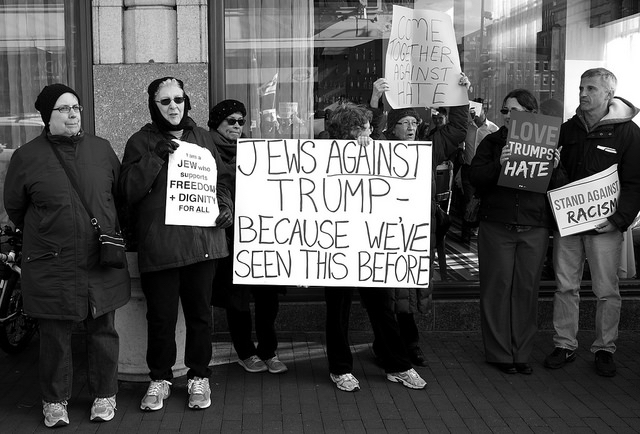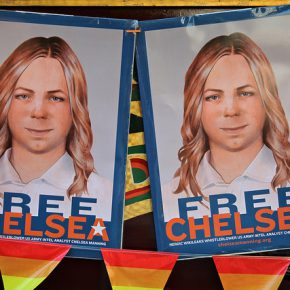The 2016 presidential race left America more polarized than ever. Also affected were US Jews, not least by an unnerving resurgence of anti-Semitism in the wake of the Trump campaign, which was stoked, many claim, by senior advisor Steve Bannon and the extremist right-wing ideologues of his alt-right base.
At the same time, ‘pro-Israel’ hardliners on both sides of the Atlantic are looking to Donald Trump with high hopes. In the words of Trump, Barack Obama – bent on negotiating with the Iranian regime and often critical of settlements and Israeli policies in the West Bank – “was the worst thing that ever happened to Israel.”
America’s president-elect has promised to break with the direction of the foreign policy of the Obama era, which was characterized by a growing liberal and left-wing Jewish American opposition to Israeli government policies. A Trump presidency is already set to deepen schisms within the largely liberal Jewish community and to heighten the contradictions of Zionist politics.
To make sense of this, Souciant spoke with Dov Waxman, a professor of political science, international affairs, and Israel studies, and the Stotsky Professor of Jewish Historical and Cultural Studies, at Northeastern University. He is also the co-director of the university’s Middle East Center.
Waxman’s most recent book Trouble in the Tribe: The American-Jewish Conflict over Israel, was published earlier this year.
Do you think that the Trump Administration will mark a real departure from what Obama tried to achieve in recent years?
Waxman: It’s still early in the transition and so we are all speculating about what direction the Trump Administration is likely to take. One of the things that makes it so hard to predict is that Trump not only has no experience in office, and no policy -making experience but his statements and comments about the Israeli-Palestinian conflict have been ambiguous at best, if not downright contradictory. Early on in his campaign he said he would try and be a neutral mediator in brokering an Israeli-Palestinian peace agreement. Later in the campaign, he said he was going to be the most pro-Israel president. It is impossible to be neutral in brokering a peace agreement and be pro-Israel. So, he made various contradictory statements.
If we look at the people around him and his advisors, which is some indication about what he might do, I think the signs are pretty worrying. First and foremost, the difference is going to be in the attitude toward settlement building. The Obama Administration, like all previous administrations, has opposed Israeli settlement building, but unlikely previous administration, it has been a lot more vocal than its predecessors in criticizing Israel’s settlement building both in the West Bank and in East Jerusalem.
Trump’s advisors have said that Trump personally is not opposed to the expansion of settlements. One of Trump’s advisors on Israel, David Friedman, is a financial supporter of Israeli settlements and has spoken very positively about them. (Friedman has just been nominated by Trump to be the next US ambassador to Israel.) So it’s quite likely, it seems at least that Trump will basically give Israel a green light to expand settlements. Certainly in East Jerusalem and in the major settlement blocks in the West Bank.
The other change which you might see is less emphasis on a two-state solution to the conflict. Again, Friedman has said that Trump is not committed to Palestinian statehood. This is now also the position of the Republican Party, which has removed a commitment to the two-state solution from its platform.
I think, at best, you will see a very hands-off approach by the Trump Administration, and little attempt to restart a peace process, if not a green light to Israel to expand settlements.
The other central issue at stake is the Iran-Nuclear Deal, which Trump also criticized vehemently during his campaign. And which the Republicans also promised to renegotiate.
Waxman: I don’t think it is likely that they will actually renegotiate the Iran nuclear deal. Renegotiating the agreement requires the consent of the other permanent members of the UN Security Council and Germany (the P5+1). The Europeans, the UN, the Russians, all believe that the agreement is working, so I don’t think they are going to agree to renegotiate an agreement which took years to achieve in the first place. And I don’t think the Iranians would agree to it either. What the Trump Administration is more likely to do is try to ensure that Iran strictly adheres to the agreement, or create a situation in which Iran will walk away, and in which Iran will be blamed for reneging on its side of the agreement rather than the US pulling out.
During the Obama era, American Jewish organizations critical of Israeli policies grew in size and influence. If, as you said, the Obama Administration was more vocal in criticizing the Israeli government in regards to settlements, was it aligned in this with a growing part of the Jewish community?
Waxman: Yes, absolutely. One example is J Street, which was founded right at the time Obama came into office, and which is a lobby organization critical of settlements, strongly committed to a two-state solution, and in favor of the deal with Iran. The Obama Administration welcomed J Street and included it among the Jewish organizations it consulted with. Sometimes the administration didn’t go as far as J Street would have liked, but generally speaking, they were aligned.
J Street, in particular, issued a very critical statement after Donald Trump appointed Steve Bannon to the White House, and other liberal organizations followed suit. Is it correct that some conservative and establishment organizations refrained from criticizing Trump as loudly, or did not do so at all? And is that the beginning of even stronger partisan division among American Jews?
Waxman: I think so. For the most part, the response to Trump and in particular to the appointment of Steven Bannon has gone along fairly predictable lines, with liberal and left-wing Jewish organizations coming out in opposition, denouncing Bannon in particular, and more centrist or right-wing organizations either remaining silent, or welcoming Trump’s victory. The only exception was the position of the Anti-Defamation-League, which is a centrist organization but was very vocal in criticizing the appointment of Bannon. Of course, the ADL has as its central mission the fight for civil rights, and combating prejudice, Islamophobia, and anti-Semitism, while other groups like AIPAC or the American Jewish Committee are much more Israel-focused.
It is certainly going to be very hard for centrist Jewish organizations that need to work with the Trump administration to face Jews who oppose his administration. Trump’s presidency is going to strengthen and galvanize leftwing, progressive Jewish organizations in opposition to Trump. And on the other hand, it is also going to strengthen right-wing Jewish organizations who will be embraced by the Trump administration and who will find open doors and access to the White House. So in terms of organizational splits and divisions among American Jews I expect them to be exacerbated in the next four years.
The insinuation that presents itself here is, of course, that these groups are willing to overlook the bigotry presented by Trump, because they like his politics in regards to Israel and the Middle East.
Waxman: That is certainly the perception of many liberal-leaning American Jews and many among the left within the American Jewish community. I think there is some truth to that, but I would also caution that one of the issues today is that the perception of anti-Semitism to some extent is in the eye of the beholder. Take, for example, the ZOA, the Zionist Organization of America, which has very publicly embraced Bannon and the Trump Administration.
I think they genuinely do not believe that Bannon is anti-Semitic or that there is any problem with him and his former website, Breitbart News, at all. They see anti-Semitism basically as coming from the left, from critics of Israel or supporters of BDS, and they have trouble perceiving it when it’s coming from the right. One of the problems today is that Jews on the left perceive anti-Semitism coming from the right, and Jews on the right perceive it on the left but not vice versa. I think that genuinely each side doesn’t see, or isn’t willing to see perhaps, the anti-Semitism that’s originating from its own side of the political spectrum.
Groups in the center, which chose to be silent, particularly AIPAC or other mainstream organizations, are another issue. There are a couple of reasons: One is that they prefer quiet, back-channel criticism. If they have concerns, about presidential appointments or policies, they tend to work behind the scenes. They are not going to do so very publicly. We don’t know what phone calls were made or what concerns were expressed privately.
Many of the major Jewish organizations believe their job requires them to work with every administration, Democrat or Republican. They have to work with this administration on many issues that matter to them, no matter what, and they don’t want to burn their bridges with the Trump Administration early on. So it is not only because they may believe that Trump is going to be a pro-Israel president that they haven’t protested loudly.
That’s interesting what you are saying about the inability to perceive anti-Semitism in some contexts. The main criticism of Bannon in my view is that some of the rhetoric in the later stages of the campaign employed anti-Semitic tropes. One ad in particular very obviously employs them, about a cabal of international bankers dead set on destroying US sovereignty.
Waxman: Yes, and don’t get me wrong, I definitely think that, like you said, Trump and Bannon trafficked in anti-Semitic stereotypes and tropes and symbols, and there is very good reason for concern about, at the very least, dog-whistle-anti-Semitism. Either they are shockingly ignorant and unaware of how these things can be understood as anti-Semitic, or they are basically willing to go with it anyway. And I think that’s very alarming. The claim that some on the right have made that Bannon is not anti-Semitic is really beside the point. It’s not the question whether Bannon himself hates Jews. The point is that he seems to be willing to traffic in anti-Semitic tropes.
And there is a double standard here. Right now there are accusations of anti-Semitism being leveled against Keith Ellison, the Democratic congressman looking to become head of the DNC, by groups on the right like the ZOA, and even by the ADL. In my opinion what these accusations are based on is nowhere as serious as things that came out of the Trump campaign.
Some were even calling these attacks on Ellison disingenuous, or “a smear campaign”.
Waxman: I can’t say whether it’s disingenuous because that would require me to know what’s in their hearts. People often see what they want to see. Those on the right, their anti-Semitism detectors are finely tuned when it comes to critics of Israel on the left. Even the slightest whiff of anti-Semitism they detect, whereas they seem to be completely turned off when it’s coming from individuals in their own camp. And vice versa. So I don’t think it’s disingenuous or, as some people call it, playing the anti-Semitism card as if its was designed deliberately to silence criticism of Israel. I think they actually do believe there is anti-Semitism, but they are often unable to see it when it comes from people who support the kind of policies that they support.
I guess this idea of a political blind spot applies to many contexts. You can observe it for example in Europe, where the right is very finely attuned to Muslim expressions of anti-Semitism, but ignores it among its own ranks.
Waxman: As a consequence, unfortunately, nowadays the discussion about anti-Semitism has become extremely politicized and partisan.
In your book, you point out that a critical view of Israeli policy is becoming more prevalent in particular among young Jews. How will a Trump Administration – “the most pro-Israel administration ever”, as some have promised – affect this dynamic, particularly given the fact that most American Jews voted Democratic and tend to be very liberal, and young people even more so. Will young Jews feel alienated both from a Trump government and, as a consequence, from pro-Israel politics as well?
Waxman: Regardless of Trump, there already existed the risk of liberal, non-Orthodox young American Jews becoming more alienated from Israel in response to what they see as this increasingly illiberal shift within Israel and of what they perceive as Israel’s oppression of the Palestinians.
This risk will only be heightened if the Trump Administration, as looks likely, closely embraces the right-wing government in Israel. Three-fourths of US Jews did not vote for President Trump, so there is going to be a deep sense of unease, concern, and opposition to what a Trump presidency is going to look like.
If you add to this the perception that Trump and Netanyahu are close partners, and that the Israeli government and the Trump Administration share a common outlook and set of values, then I think that will widen the divide between American Jews and Israel. There already exists an emerging, what I would call, “values divide“ between the Israeli Jewish population and government and American Jews who are generally liberal and progressive, and in favor of a two-state solution and optimistic that it can come about.
The Israeli government, in contrast, is deeply conservative, illiberal in many of its attitudes, and significant parts of it are opposed to a two-state-solution. That divide of positions and values already exists, and it will only be accentuated the more that a Trump Administration is aligned with the Israeli government. I believe that this will lead in turn to a growing alienation between some young American Jews and Israel.
The same value divide exists inside Israel as well, right?
Waxman: Yes, it does. Israelis are divided as well, that’s true. But basically Israeli Jews are generally a lot less liberal than US Jews, American Jews being probably more liberal than Jews anywhere in the world. Israeli Jews lean to the right; American Jews tend to lean to the left.
Maybe it’s the kind of Israeli Jews you meet in Europe who are very young, and international, who give me the impression that Israeli culture can be very liberal as well.
Waxman: Yes, but that’s part of the reason they live in Europe (laughs). It’s true, certainly, and if you go to Tel Aviv as well, that there is a vibrant liberal society there, but many of those Israeli Jews who are progressive and liberal feel under siege in Israel today. You know, they feel that they have lost their country. Maybe in a way that is what many American Jews will start to feel like now as well.
Depending of course on what Trump actually is going to do.
Waxman: Right. One of the things we can already say, though, is that the Orthodox American Jews will find themselves very comfortable with a Trump Administration. Trump is the first president to actually have Orthodox Jewish grandchildren. His daughter, Ivanka, converted to Orthodox Judaism, his son-in-law is an Orthodox Jew, and also many of his advisers are Orthodox Jews. So he will be comfortable with the Orthodox community, but among non-Orthodox Jews he is going to be unpopular.
One of the things that I describe in my book is an underlying divide between Orthodox and non-Orthodox Jews, and I think that divide is going to be exacerbated further. Ultimately this divide is a product of deeper trends that are happening not only in the Jewish community but all over the world, a growing divide between secular liberal versus conservative and religious communities. Orthodox Jews are only 10% of the US Jewish population, but nonetheless, they have a strong voice in the political discussions, and they are disproportionately involved in American Jewish politics.
And in Israeli politics as well.
Waxman: Obama may have been the closest thing to embodying the values of liberal Jews. He was very close to non-Orthodox American Jews, and his understanding of Judaism echoed that of many non-Orthodox American Jews. And Trump is going to be much closer to the Orthodox American Jewish community.
People often argued that Trump symbolizes a break with the social conservatism of the Republican base, for example, due to the public way in which he has embraced LGBT-people in front of Republican audiences after the terror attack of Orlando. But I don’t really see it. He was voted in by, for example, an overwhelming majority of evangelical Christians.
Waxman: Yes, it is just a bizarre thing, but a guy like Trump, hardly a paragon of morality, has become the standard bearer for both the American Christian and Jewish right.
Photograph courtesy of Stephen Melkisethian. Published under a Creative Commons license.





